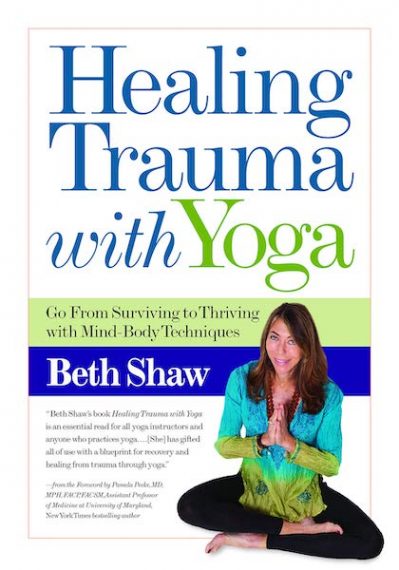Traumatized people chronically feel unsafe within their bodies. Beth Shaw has the answer. Building on personal therapy, her book provides a thoughtful solution to those who are suffering from trauma, looking to become more resilient in their life as well as for yoga practitioners. She begins the book sharing her own personal trauma which led her to a deeper path of yoga and onto healing. In her words, “It’s literally saved her life on many occasions.” And you can see why that would be so, based on what you learn from Shaw’s past.
This is not just a healthy, uplifting, feel-good book packed with inspiration. In addition to those elements, it’s a practical, well-researched instructional manual on how yoga can heal.
The book begins with an understanding of trauma and its effects on the mind, body and spirit. It then provides greater understanding to the neurological effects of sustained PTSD, including negative self-image, health disorders and long-term issues in personal and professional functioning. It’s clear that Shaw has done her homework in the way that she outlines the physical and psychological processing the body and mind impart on when faced with trauma and ensuing triggers. She makes a compelling point in how learning to control your breath and using asanas as a form of stress release have profound management and healing impact.
Of course, how the body and mind heal is explained along with case studies of how yoga has helped victims of trauma, and the like, combat triggers and rewire your brain to a healthier operating state.
As a yoga practitioner, RYT, I especially appreciate how she’s created a parallel between the eight limbs of yoga and the healing steps.
Shaw also includes illustrations of basic asanas and insight on how coupling movement with Ayurveda remedies and other complementary resources helps rebalance the nervous system and provides a self-therapeutic set of remedies. I do want to stress; Shaw does make a point of how these forms of healing are no substitute for more traditional routes. She urges all trauma victims, and those new to the yoga journey, to consult first with medical (and mental health) providers to ensure the most robust form of therapy.
Source: Cardinal Publications
Images Courtesy of Cardinal Publications


No comments yet.